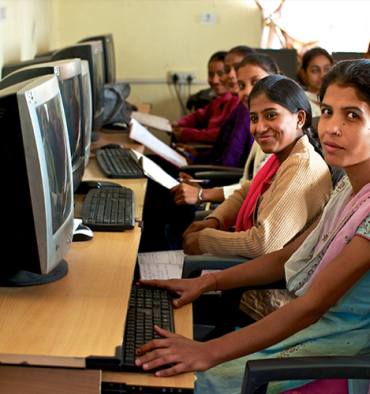
With a market-oriented approach, an NGO in Delhi is ensuring the skills it imparts finds value with employers.
Fresh-faced young people mill about as they wait to receive their certificates. Six of them already have appointment letters from Burger King in their hands.
"Can you imagine," says Ghulam. "This is going to be my first job. To think that just four months ago, I was jobless and with poor prospects of finding employment."
At a time when skilling has become the new, but often empty, buzzword heard in political and development circles, these young people at the Dwarka centre of Saksham, a training and placement programme, chatter excitedly about how it has transformed their lives.
And it has. Since 2010, Saksham, one of Plan India's flagship programmes, has trained and placed over 3,000 young people from some of Delhi's poorest neighbourhoods.
Using a market-driven approach to train youths between 18 and 25 years of age, the NGO is currently running eight such centres across the capital.
"We believe that providing skills alone doesn't change anything -- real change occurs post training, when trainees are able to use these skills to get suitable jobs and become economically empowered," says Bhagyashree Dengle, executive director of Plan India.
The training programme uses several key approaches to ensure that the skill-sets it provides are in line with market demands.
An initial study identifies potential trades for vocational training. Potential local employers are then quizzed about their requirements, and based upon these, local youths are trained.
In Delhi's upcoming suburb Dwarka, for instance, the mushrooming of new malls has led to a demand for jobs in retail, hospitality and banking sectors.
So at the Saksham centre there, youths are trained for three months as cashiers, servers and salespeople. However, the programme does not focus on skill training alone.
Trainees undergo classes in spoken English, public speaking and life skills too.
Unsurprisingly, 78 per cent Saksham trainees find jobs after training. Amongst the rest, some feel motivated enough to resume their education.
All of them learn to navigate adulthood with confidence and compassion.
Trainers at Saksham follow their progress for six months after employment, to help ease the transition and smoothen any rough edges.
I meet Majma, who has been working in Burger King since 2014. "My bosses have been so impressed by my people skills that I've now been promoted to the position of guest relations manager," said she. "Now I interact with customers, resolve their issues and more."
Women like Majma have become role models and agents of change in their communities. "When parents see their daughters confidently going to work in a clean, air-conditioned mall or departmental store, it helps them understand how their daughters can be assets," said Dengle.
In fact, the Saksham model offers interesting insights into the issue of integrating young girls from underprivileged but conservative backgrounds into the workforce.
"While we try to persuade parents, we also try to ensure that companies place at least a couple of our girls together so that they do not need to commute to work alone."
Also, during training, girls and boys learn to work together comfortably while respecting boundaries. "We notice that most girls who come to us, seem to blossom with self-confidence by the time they complete their training," says Dengle.
Today, much of Saksham's work remains about drumming up youth mobilisation and participation. Parental counselling, especially when it comes to getting girls to sign up, is of paramount importance. But it requires intensive resources that Plan India does not have.
The road ahead is daunting, but hopefully, their market orientation will ensure that Saksham stays on track and scales up to the next level.
"We aim to touch the lives of 100,000 youths by 2020," says Dengle. The cost of training one individual for three months is merely Rs 7,500. "It is insignificant compared to its immense impact, because these young people, especially girls, emerge to contribute positively to the nation's economic development, as well as effect social change in their communities," she says.
Additionally, Dengle and her colleagues also plan to ask companies to fund training in their specific job requirements.
Meanwhile, at the Saksham centre at Dwarka, Plan International's CEO Anne-Birgitte Albrectsen has come to give away course completion certificates to the latest batch of trainees, all smartly turned out in formal clothes.
"I hope to see all of you achieve great things in the decade to come," says she, listening to them talk of a future that they now know, because of Saksham, is full of new employment opportunities. And unlike their peers, Saksham's trainees are trained to tap into them.
For more, visit www.planindia.org
Photograph: Kind Courtesy, Plan India










